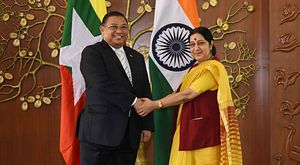On Thursday, India and Myanmar announced that they would deepen their defense cooperation. A joint consultative commission, chaired by Indian External Affairs Minister Sushma Swaraj and Burmese Foreign Minister Wunna Maung Lwin in New Delhi announced a defense assistance program which will see India help the Burmese Army and Navy modernize. Myanmar has been an important peg in India’s decades-old ‘Look East’ Policy, which the current Indian government recast as an ‘Act East’ policy some months ago. Defense cooperation between the two neighbors has grown since Myanmar’s political reforms under President Thein Sein, which resulted in Myanmar becoming less exclusively reliant on China.
A joint statement released by the joint commission announced the expansion of defense assistance from India to Myanmar:
India is committed to support the modernization of Myanmar Armed Forces and would be happy to share its experience in functioning in a democratic environment, in creating a national army, cooperation in the field of IT, in dealing with emerging security challenges, and military to military cooperation including in terms of training. She also expressed India’s commitment to cooperate with Myanmar in building a professional and capable Myanmar Navy to safeguard and ensure its maritime security.
The announcement comes mere weeks after Indian commandos entered Burmese territory to pursue rebels after they attacked Indian army troops. The strike was quickly sensationalized by the Indian media and even the government, and conflicting reports about the extent to which Myanmar was notified of the strike and cooperated with India drew criticism against the Indian government.
According to the Economic Times, the joint committee also noted that India and Myanmar would work together on effective border management, specifically on the issue of cross-border insurgency. Specifically, the joint statement notes that both countries will “fight the scourge of terrorism and insurgent activity in all its forms and manifestations.” The statement emphasizes the role of the Regional Border Committee in monitoring insurgent activity across the Indo-Myanmar border.
Indian Prime Minister Narendra Modi, who visited Myanmar late last year to attend the East Asia and Association of Southeast Asian Nation summits, is expected to travel to Naypyidaw this year. At a separate meeting with the Burmese foreign minister in Delhi on Wednesday, Modi called for greater cooperation between India and Myanmar on a range of a issues. Modi additionally “reaffirmed India’s position as a reliable partner in Myanmar’s development… and highlighted the importance of Myanmar for peace and stability in the region, and for India’s connectivity with Southeast Asia.”

































